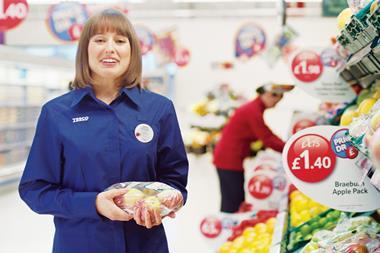Scotland's ground force digs for victory
Scotland is a major supplier of soft fruit, and when it comes to veg shoppers like convenience says David Shapley
At this time of the year Scottish soft fruit growers are busy men. The sector, valued by the Scottish National Farmers' Union at between £14-£16m at farm gate, makes a major contribution to the horticulture economy in terms of both fresh and processed raspberries and strawberries.
One of Scotland's largest berry fruit marketing groups, Angus Soft Fruit, is testing new varieties of strawberries which md Lochart Porter believes could revolutionise the industry. It could also open a new chapter in economic collaboration. Under a joint venture with Israeli plant breeders, the new fruit, when registered, could provide an additional source of revenue when offered to the industry internationally.
The programme began several years ago when ASF was first established by three growers in 1994, with technical director David Griffiths painstakingly having to evaluate no fewer than 25,000 potential Scottish grown varieties. The selection is now down to two, which are stillso new they are only classifed by number.
Porter says: "We hope to launch these this summer. Fruit is already being evaluated by our supermarket customers."
Scottish soft fruit, grown on the climatic edge of production, is recognised for its summer quality, but growers are keen to find strawberries which can ripen earlier and later to extend the season beyond May to October. "The Elsanta variety has been the industry's benchmark for a long time," says Porter. "We have been able to extend the timescale by protective tunnels and cold storing plants, but are looking for something more, such as an everbearer that will crop continuously."
The result could be good news for the 16-strong growers which market their total 400 acre crop through ASF. It would enable the company to increase production from 2,500 tonnes, which includes raspberries.
Specialist, added value products are also starting to appear. A new luxury strawberries and chocolate dip product has just been launched by Sainsbury and Tesco this summer. The idea was conceived and is being produced by Abbey Fruit, an independent centralised packhouse based in Arbroath. Since opening for business two years ago, the purpose-built modern facility has been packing fruit for Scottish growers for supply to most of the UK's major multiples.
The company has spent over a year developing and protecting the product. Chief executive Robert Etherson comments: "Quality strawberries have always been perceived as a luxury item. However, we felt they lacked suitable packaging to enhance that reputation. Our product is attractively packaged with a high quality chocolate flavoured dip."
The market for Scottish field vegetables and root crops, excluding potatoes, is growing, with the market rising from £35.4m in 1995 to £42.8m in 1999.
Kettle Produce sales director Andy Laing says Scottish consumers increasingly want convenience products such as ready prepared carrots and swedes in microwaveable bags and fresh snack packs. The company is Scotland's largest grower/ packer with 7,500 acres under production in the centre of the country and further north towards the Black Isles. It also sources from 75 growers as far afield as East Anglia and Murcia in Spain.
"We grow virtually every temperate field vegetable you can think of, except potatoes," says Laing. "Scotland also has high quality root crops and, in many cases, their reputation has been enhanced by the ability to store year-round."
But it is in the prepared range where the biggest shift has been experienced. Kettle offers some 25 lines, from vegetable kebabs, crudités to simple carrot batons, all under supermarket own label. "We are in every multiple through the UK," says Laing.
But if business is booming, he says that Scottish vegetable producers, like their British counterparts, have been going through difficult times. Due to bad weather and oversupply, the industry has suffered three poor seasons. "The fact that we are adding value to a product has been a blessing," he says.
Fresh herbs have become a boom business over the past decade and Scotland is in the forefront of development, based on demand from hoteliers and foodservice, and, more recently, from multiples north of the border. The largest, Scotherbs, almost came into the business by accident, says md Robert Wilson. Originally a family dairy business, it began diversification in 1985. The company grows a range of over 20 varieties, from popular lines such as parsley to herbs for the niche market.
Wilson is in production both under cover and in the open from May until October.
In the winter, herbs are sourced from Israel through Carmel and Arava, and direct from Spain and the Canary Isles.
From small beginings, Scotherbs now employs over 40 staff. Herbs are both prepacked and grown in pots, with the latter aimed at wholesale.
{{Z SUPPLEMENTS }}
Close menu
- Home
- Retail & Wholesale
-
Products & Suppliers
- Back to parent navigation item
- Products & Suppliers
-
Product Categories:
- Back to parent navigation item
- Product Categories:
- Alcoholic drinks
- Bakery
- Cereals & breakfast
- Cheese
- Chicken & poultry
- Chocolate
- Confectionery
- Crisps, nuts & snacks
- Dairy
- Fish
- Fresh produce
- Frozen
- Household
- Meat
- Own Label
- Sauces & condiments
- Seasonal
- Soft drinks
- Vaping
- Vegan & plant-based
- World foods
- Suppliers
- People
- Reports & Data
-
Topics A-Z
- Back to parent navigation item
- Topics A-Z
-
Popular topics:
- Back to parent navigation item
- Popular topics:
- Cost of living crisis
- Crime
- Deposit Return Schemes
- Finance
- Government & Regulation
- Health
- Inflation
- Loyalty
- Marketing
- Mergers & Acquisitions
- New Product Development
- Sourcing
- Supply chain
- Sustainability & environment
- Technology
- Ultra Processed Foods
- Vaping
- A-Z all topics
- Content by type:
- Events
- Ask iA (beta)
- Subscribe now
Sign in to comment on this article
Not logged in before? Register for FREE guest access today.
You will be able to:
- Read more stories
- Receive daily newsletters
- Comment on stories
Advert
Related articles
-

-

-

-

-

10 charts that explain UK attitudes to food provenance
Paid for and in partnership with Cymru Wales













No comments yet